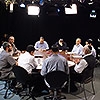Question: When holding round tables, there should be no disputes or criticism. You can criticize the idea itself, but not each other. Should criticism be constructive?
Answer: Arguing and criticizing are not allowed, only clarification of the opponents point of view and meticulously clarifying why he thinks this way and not otherwise.
Question: What should we do if after clarifications two or three opinions are formed?
Answer: Continue scrutinizing until you find something in common. Or you can come to several conclusions, but they should express the general opinion of all, which led to two or three decisions. In one case, like this, with another, like this, and with the third, like that.
Question: If we decide at a round table where to hold an event, such as a picnic, then coming to two or three opinions does not matter much. And if we are solving issues at the national level, must we come to one opinion, to one decision?
Answer: The round table must end with a clear resolution.
Question: Who says the last word: the chief, the president, the moderator of the circle?
Answer: Nobody. A round table can’t end with someone’s single opinion, otherwise it’s not a circle!
Question: Let’s say we are deciding whether or not to introduce a quarantine in the country and we come to two opinions. What’s next?
Answer: This is the end of the round table and the decision will be made outside the round table. How else could it be? It is impossible to bend a round table under some sort of a straight line!
Question: So if you are, say, the minister of health, and I am the minister of economy, and we have not come to a single decision, then we go to the president, and the final decision is up to him?
Answer: Yes. This was the end of democracy. The president is already deciding exactly what to do.
[270734]
From KabTV’s “Management Skills” 7/9/20


No comments:
Post a Comment